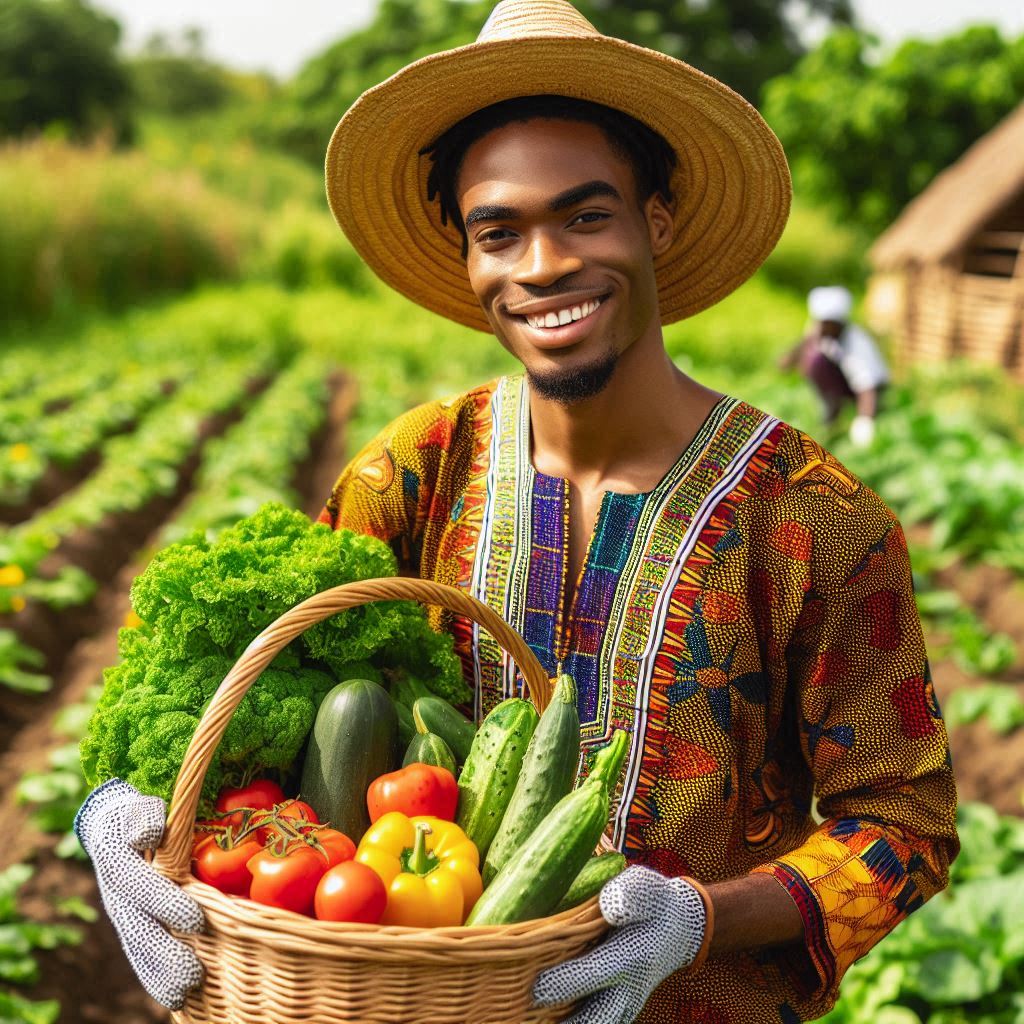Introduction
Nigerian agricultural science education is pivotal in fostering sustainable development and food security. It encompasses various disciplines such as agronomy, animal science, and agricultural engineering.
NGOs play a crucial role in enhancing the quality and accessibility of agricultural education across Nigeria.
Overview of Nigerian Agricultural Science Education
Nigeria’s agricultural sector is the backbone of its economy, employing a significant portion of the population and contributing substantially to the GDP.
Agricultural science education forms the foundation for this sector, equipping individuals with the knowledge and skills needed to address the challenges faced by the agricultural industry.
Importance of NGOs in Supporting Agricultural Education
NGOs play a vital role in supplementing the efforts of governmental institutions in advancing agricultural education in Nigeria.
They operate independently or in collaboration with government agencies, educational institutions, and other stakeholders to address various aspects of agricultural education, including curriculum development, training programs, research initiatives, and infrastructure development.
Enhancing Curriculum Development
NGOs actively contribute to the design and implementation of relevant and updated curricula that meet the evolving needs of the agricultural sector.
By collaborating with educational institutions and industry experts, NGOs ensure that agricultural science programs incorporate practical skills,
emerging technologies, and sustainable practices, thereby enhancing the employability and competitiveness of graduates in the agricultural workforce.
Facilitating Training Programs
NGOs organize training workshops, seminars, and capacity-building programs to enhance the knowledge and skills of students, educators, and practitioners in the agricultural field.
These initiatives cover a wide range of topics, including crop production techniques, livestock management, agribusiness management, and sustainable farming practices.
By providing hands-on training and exposure to real-world challenges, NGOs empower individuals to make meaningful contributions to the agricultural sector.
Promoting Research and Innovation
NGOs play a pivotal role in promoting research and innovation in agricultural science by funding research projects, establishing research centers, and facilitating collaborations between researchers, policymakers, and industry stakeholders.
Through research grants, scholarships, and fellowships, NGOs encourage students and researchers to explore new ideas, develop innovative solutions, and address pressing issues facing the agricultural sector, such as climate change,
food security, and rural development.
Investing in Infrastructure Development
NGOs contribute to the development of agricultural infrastructure by supporting the construction and renovation of classrooms, laboratories, and research facilities in educational institutions.
By providing access to modern equipment, technology, and resources, NGOs create conducive learning environments that foster academic excellence, innovation, and entrepreneurship in the field of agricultural science.
In general, NGOs play a critical role in advancing agricultural education in Nigeria by enhancing curriculum development, facilitating training programs, promoting research and innovation, and investing in infrastructure development.
Their collaborative efforts with government agencies, educational institutions, and other stakeholders are instrumental in shaping the future of the agricultural sector and ensuring its sustainability and resilience in the face of global challenges.
History of NGOs in Nigerian Agriculture
Since the early 20th century, NGOs have played pivotal roles in advancing agricultural science education in Nigeria. Their contributions have significantly shaped the landscape of agricultural development in the country.
Key NGOs Involved in Agricultural Science Education in Nigeria
- Nigerian Conservation Foundation (NCF): Established in 1980, NCF focuses on environmental conservation and sustainable agriculture. Through various educational programs, it has enhanced awareness and understanding of agricultural practices among Nigerian communities.
- Songhai Centre: Founded in 1985, Songhai Centre promotes integrated farming systems and provides training in agricultural entrepreneurship. Its holistic approach encompasses agribusiness education, technical skills development, and sustainable farming practices.
- International Institute of Tropical Agriculture (IITA): IITA, founded in 1967, is renowned for its research and development initiatives in tropical agriculture. It collaborates with local stakeholders to disseminate agricultural knowledge and improve farming techniques across Nigeria.
- Farmers Development Union (FADU): FADU, established in 1978, focuses on empowering smallholder farmers through capacity building and access to resources. Its educational programs aim to enhance farmers’ productivity and promote sustainable agricultural practices.
- Development Exchange Centre (DEC): DEC, founded in 1987, advocates for rural development and agricultural sustainability. Through community-based projects and educational campaigns, it fosters knowledge exchange and skills transfer in agricultural science.
Impact of NGOs on Agricultural Education Development
NGOs have significantly contributed to the development of agricultural education in Nigeria by:
- Increasing Awareness: Through outreach programs and workshops, NGOs have raised awareness about the importance of agricultural science education among farmers, policymakers, and the general public.
- Building Capacity: NGOs provide training and technical assistance to farmers, extension workers, and agricultural students, enhancing their skills and knowledge in modern farming techniques and sustainable practices.
- Promoting Innovation: NGOs support research and development initiatives, fostering innovation in agricultural science and technology. They facilitate the adoption of new technologies and best practices to improve productivity and efficiency in the agricultural sector.
- Empowering Communities: By promoting community-led initiatives and participatory approaches, NGOs empower local communities to take ownership of their agricultural development. They facilitate knowledge sharing and collaborative problem-solving, fostering resilience and sustainability in rural areas.
- Advocating for Policy Change: NGOs engage in advocacy and policy dialogue to influence decision-makers and promote favorable policies for agricultural education and development. They advocate for increased investment in agricultural infrastructure, education, and research to support sustainable agricultural growth.
In short, NGOs have been instrumental in advancing agricultural science education in Nigeria.
Their efforts have not only improved the livelihoods of farmers but also contributed to the overall development and sustainability of the agricultural sector in the country.
Read: Digital Learning Platforms in Nigeria
Role of NGOs in funding
NGOs play a crucial role in the funding of Nigerian agricultural science education. They provide essential financial support to educational programs in the agricultural sector, which is vital for the improvement of the quality of education.
In this section, we will explore how NGOs contribute to funding and why financial assistance is crucial for the advancement of agricultural science education in Nigeria.
NGOs provide financial support to agricultural education programs
NGOs have been actively involved in funding various agricultural education programs in Nigeria. They understand the importance of investing in education to promote sustainable agricultural practices and ensure food security.
By providing financial support, NGOs enable educational institutions to enhance their infrastructure, curriculum, and research capabilities.
NGOs also offer scholarships and grants to students pursuing degrees in agricultural science.
This financial assistance not only supports the education of aspiring agricultural scientists but also encourages more young individuals to pursue careers in this field.
Additionally, NGOs collaborate with educational institutions to develop training programs that equip students with practical skills and knowledge required for the agricultural sector.
Importance of financial assistance in improving education quality
Financial assistance from NGOs is crucial for improving the quality of education in the agricultural sector.
With proper funding, educational institutions can upgrade their facilities, invest in modern technology, and provide hands-on learning experiences for students.
This creates a conducive environment for research, innovation, and experimentation, leading to significant advancements in agricultural science.
Furthermore, financial support allows educational institutions to attract and retain qualified faculty members who can impart knowledge and skills to students effectively.
It also enables the development of comprehensive curriculum that aligns with industry standards and practices, preparing students for successful careers in agriculture.
By investing in education, NGOs contribute to the overall growth and development of the agricultural sector in Nigeria.
In summary, the role of NGOs in funding Nigerian agricultural science education is essential for the progress and sustainability of the sector.
Through financial support, NGOs help improve the quality of education, promote innovation, and cultivate a new generation of agricultural professionals.
Their contributions play a significant role in shaping the future of agriculture in Nigeria and ensuring food security for generations to come.
Read: Educational Tech Startups in Nigeria
Training and Capacity Building: Empowering Nigeria’s Agricultural Science Education
NGOs play a pivotal role in bolstering agricultural science education in Nigeria through comprehensive training and capacity-building programs.
These initiatives are instrumental in equipping both teachers and students with the requisite skills and knowledge to thrive in the agricultural sector.
Empowering Teachers
NGOs organize specialized training sessions aimed at empowering agricultural science teachers across Nigeria.
These programs focus on enhancing pedagogical techniques, updating curriculum knowledge, and integrating innovative teaching methodologies.
Through workshops and seminars, teachers are equipped with the latest agricultural advancements, ensuring they deliver up-to-date and relevant content to their students.
Practical demonstrations and hands-on activities are often incorporated to reinforce theoretical concepts and foster experiential learning.
Strengthening Student Competencies
NGOs extend their support to students by offering tailored training programs designed to nurture their interest and proficiency in agricultural science.
These initiatives encompass various activities such as field trips to farms, interactive learning sessions, and competitions to stimulate curiosity and engagement.
By providing access to resources and mentorship opportunities, NGOs empower students to explore diverse facets of agricultural science, from crop cultivation to livestock management.
Practical training enables them to develop practical skills and gain firsthand experience in agricultural practices.
Enhancing Skills and Knowledge
Capacity building lies at the core of NGO-driven initiatives in agricultural science education.
By imparting specialized training, these organizations facilitate the acquisition of technical competencies essential for success in the agricultural sector.
Participants undergo rigorous training modules encompassing topics such as soil management, crop production techniques, and agribusiness principles.
The emphasis is placed on fostering critical thinking, problem-solving, and entrepreneurial skills to prepare individuals for the dynamic landscape of modern agriculture.
Fostering Innovation and Entrepreneurship
NGOs cultivate an environment conducive to innovation and entrepreneurship within the realm of agricultural science education.
Through incubation programs and mentorship initiatives, aspiring agripreneurs are guided in developing sustainable business models and leveraging technological advancements to address agricultural challenges.
By instilling an entrepreneurial mindset, participants are encouraged to explore value-added opportunities in agriculture, from agro-processing to agro-tourism.
This not only enhances economic prospects but also contributes to the overall socio-economic development of rural communities.
In a nutshell, the role of NGOs in training and capacity building within Nigerian agricultural science education cannot be overstated.
By empowering teachers and students alike, these organizations foster a culture of learning, innovation, and entrepreneurship essential for the sustainable advancement of the agricultural sector.
Through collaborative efforts, stakeholders can collectively work towards harnessing the full potential of agriculture as a catalyst for national growth and prosperity.
Read: Online Courses in Curriculum Studies Nigeria

Research and Innovation in Nigerian Agricultural Science Education
NGOs Spearheading Research Initiatives
NGOs play a pivotal role in driving research initiatives within Nigerian agricultural science education.
They actively collaborate with universities, research institutions, and local communities to identify pressing issues and devise innovative solutions.
Empowering Local Researchers
NGOs empower local researchers by providing funding, training, and access to resources necessary for conducting impactful studies.
Through grants and scholarships, they enable researchers to explore new methodologies, technologies, and approaches to address agricultural challenges.
Facilitating Knowledge Exchange
NGOs facilitate knowledge exchange between researchers, practitioners, and policymakers through workshops, conferences, and seminars.
These platforms foster collaboration, promote interdisciplinary dialogue, and disseminate research findings to a wider audience.
Promoting Sustainable Practices
NGOs advocate for sustainable agricultural practices by supporting research on eco-friendly farming techniques, soil conservation methods, and water management strategies.
They emphasize the importance of preserving natural resources for future generations while enhancing productivity and profitability.
Harnessing Technological Innovations
NGOs leverage technological innovations to revolutionize agricultural practices and enhance productivity.
They invest in research and development of advanced tools, machinery, and digital solutions tailored to the needs of smallholder farmers and rural communities.
Digitalization and Data Analytics
NGOs embrace digitalization and data analytics to optimize agricultural processes, improve decision-making, and mitigate risks.
They collaborate with tech companies and startups to develop mobile applications, sensor technologies, and predictive analytics models for monitoring crops, predicting weather patterns, and managing pests.
Enhancing Access to Information
NGOs bridge the digital divide by providing farmers with access to relevant information and resources through online platforms, extension services, and community outreach programs.
They empower farmers with knowledge on best practices, market trends, and agricultural innovations to increase their resilience and competitiveness.
Fostering Entrepreneurship
NGOs nurture entrepreneurial skills among youth and women in rural areas through training programs, mentorship, and access to microfinance opportunities.
They encourage innovation and creativity in agribusiness ventures, promoting economic growth, job creation, and poverty alleviation.
Collaborative Partnerships
NGOs foster collaborative partnerships between academia, government agencies, private sector stakeholders, and civil society organizations to address complex agricultural challenges holistically.
By pooling resources, expertise, and networks, they amplify impact and drive systemic change.
In essence, NGOs play a crucial role in driving research and innovation in Nigerian agricultural science education.
Through collaborative partnerships, sustainable practices, and technological advancements, they contribute to the transformation of the agricultural sector, improving livelihoods and ensuring food security for future generations.
Transform Your Career with Expert Guidance
Get personalized mentorship consulting that’s tailored to your unique path. Our expert advice is actionable and exclusive.
Get StartedRead: Nigerian Curriculum Studies Academic Journals
Advocacy and policy influence
NGOs Advocacy for Policies in Agricultural Education
NGOs play a crucial role in advocating for policies that support and promote agricultural education in Nigeria.
They actively engage with government officials, policymakers, and other stakeholders to highlight the importance of agricultural education in the country’s development.
Influence of NGOs in Shaping Government Policies
NGOs have a significant influence on shaping government policies towards the agricultural sector in Nigeria.
Through their advocacy efforts, they bring attention to the needs and challenges facing agricultural education, which in turn, informs policy decisions at the national and local levels.
NGOs as Advocates for Change
NGOs use their expertise and resources to push for policy changes that will benefit agricultural science education in Nigeria.
They conduct research, gather data, and provide evidence-based recommendations to policymakers to drive positive change in the sector.
Partnership with Government
NGOs often collaborate with government agencies to develop and implement policies that enhance agricultural education.
By working together, NGOs and government entities can create more effective policies that address the specific needs of the agricultural sector and ensure the growth and sustainability of education in the field.
Impact on Government Policies
The advocacy efforts of NGOs have led to tangible changes in government policies related to agricultural education.
By raising awareness, providing recommendations, and advocating for increased funding, NGOs have influenced the development of policies that prioritize agricultural science education in Nigeria.
Sustainable Development Goals Alignment
NGOs also advocate for policies that align with the Sustainable Development Goals (SDGs) related to agriculture and education.
By promoting policies that support sustainable agricultural practices, improve access to education, and address gender disparities in the sector, NGOs contribute to the achievement of the SDGs in Nigeria.
In review, NGOs play a crucial role in advocating for policies that promote agricultural education in Nigeria.
Through their advocacy efforts, partnerships with government agencies, and alignment with the SDGs, NGOs have a significant impact on shaping government policies towards the agricultural sector.
Their dedication to improving agricultural science education in the country contributes to the overall development and sustainability of the sector.
Community Engagement: Fostering Agricultural Awareness
NGOs play a pivotal role in Nigerian agricultural science education by actively engaging with local communities. Through various initiatives, they ignite enthusiasm for agriculture and foster sustainable development.
Connecting with Communities
NGOs leverage grassroots connections to reach communities across Nigeria. They organize workshops, seminars, and field demonstrations to disseminate agricultural knowledge.
Empowering Through Education
By providing access to resources and training, NGOs empower community members to become knowledgeable about agricultural practices. This education enhances their ability to adopt sustainable farming methods.
Promoting Awareness
NGOs utilize creative strategies to raise awareness about the importance of agriculture. Through campaigns, they highlight its role in food security, economic growth, and environmental sustainability.
Fostering Partnerships
Collaboration is key to effective community engagement. NGOs partner with local leaders, schools, and government agencies to maximize their impact and reach a wider audience.
Hands-On Learning
Engaging communities in hands-on activities, such as farm visits and practical demonstrations, reinforces learning and promotes skill development among participants.
Cultivating Interest
By showcasing the diverse opportunities within the agricultural sector, NGOs inspire community members to explore careers and entrepreneurial ventures in farming and agribusiness.
Empathy and Understanding
NGOs prioritize listening to the needs and concerns of local communities. This empathy enables them to tailor their programs to address specific challenges and aspirations.
Importance of Community Involvement: Nurturing Sustainable Agriculture
Community involvement is essential for sustainable agricultural development in Nigeria. It fosters ownership, encourages innovation, and strengthens resilience within local farming systems.
Ownership and Accountability
When communities actively participate in agricultural initiatives, they take ownership of their development. This sense of responsibility fosters a culture of accountability and ensures the sustainability of interventions.
Innovation and Adaptation
Local knowledge and expertise are invaluable assets in agricultural innovation.
By involving communities in decision-making processes, NGOs tap into this wealth of wisdom and promote the adoption of context-appropriate practices.
Resilience Building
Through community engagement, NGOs support the resilience of farming communities.
By diversifying income sources, implementing climate-smart practices, and facilitating access to markets, they help communities withstand shocks and adapt to changing conditions.
In fact, the role of NGOs in Nigerian agricultural science education extends far beyond dissemination of knowledge.
Through active community engagement, they foster a culture of learning, empowerment, and sustainability.
By nurturing partnerships and prioritizing local participation, NGOs pave the way for a resilient and prosperous agricultural sector in Nigeria.
Conclusion
NGOs Empowering Nigerian Agricultural Science Education
NGOs play a pivotal role in Nigerian agricultural science education. They bridge gaps in resources, expertise, and outreach.
NGOs offer innovative programs, such as workshops and training, enhancing the practical aspect of agricultural education.
These organizations provide essential resources like textbooks, laboratory equipment, and seedlings, fostering hands-on learning experiences.
Through partnerships with schools and universities, NGOs promote curriculum development tailored to current agricultural needs.
They facilitate access to funding opportunities, scholarships, and internships, empowering aspiring agricultural scientists.
NGOs also advocate for policy changes to prioritize agricultural education, ensuring its recognition and support at all levels.
Emphasizing Continued Collaboration for Advancement
Collaboration between NGOs, government, and stakeholders is crucial for the sustained growth of agricultural education in Nigeria.
Governments should actively involve NGOs in policy formulation, leveraging their grassroots knowledge and networks.
Stakeholders must support NGOs through funding, expertise, and advocacy to expand their impact in agricultural education.
Continuous dialogue and coordination among all parties are essential to address emerging challenges and opportunities.
NGOs, with their agility and grassroots presence, can drive innovative solutions and amplify the impact of governmental initiatives.
A Call to Action
The journey towards robust agricultural science education in Nigeria requires collective effort and commitment.
NGOs, with their passion and dedication, have demonstrated their capacity to effect meaningful change.
Government support is imperative to scale up successful NGO-led initiatives and integrate them into mainstream educational systems.
Stakeholders must recognize the value of collaboration and actively engage in partnerships for sustainable agricultural education.
As we conclude, let us reaffirm our commitment to nurturing the next generation of agricultural scientists through collaborative efforts.
Together, we can build a future where agricultural education thrives, powering Nigeria’s agricultural transformation.
In summary, NGOs are catalysts for progress in Nigerian agricultural science education, filling critical gaps and driving innovation.
Collaboration between NGOs, government, and stakeholders is essential for the continued advancement of agricultural education.
Let us unite in our dedication to empowering learners, strengthening institutions, and shaping a prosperous future for agriculture in Nigeria.




